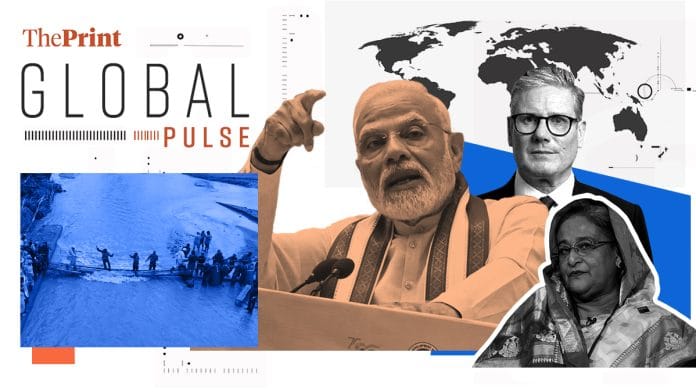New Delhi: The warming of the Indian Ocean is giving rise to flying or atmospheric rivers, i.e., storms that travel as “huge, invisible ribbons of water vapour” and dump heavy rains, BBC correspondent Navin Singh Khadka writes, explaining the phenomenon behind recent flash floods and landslides.
“An average atmospheric river is about 2,000km (1,242 miles) long, 500km wide and nearly 3km deep — although they are now getting wider and longer, with some more than 5,000km long,” Khadka writes in his report — ‘The flying rivers causing devastating floods in India’.
Floods are “not uncommon” in India, but climate change has made them more dangerous, writes Khadka. Citing IIT-Delhi research, he says 70 percent of severe floods in the monsoons between 1985 and 2020 were associated with atmospheric rivers. Similar events are unfolding in Japan, China, Iran, Iraq, Chile, and Australia, among other countries, he reports.
In Bloomberg Opinion, columnist Mihir Sharma points out that the Budget speech this time left out military spending, which has dropped below 2% of the GDP for the first time in decades. The Narendra Modi government has to spend more and put more trust in private players to make “strategic autonomy” of the military more than a catchphrase, says his piece, ‘Modi can’t build India’s military this way’.
Most of the military spending goes into personnel costs, and local defence production has remained focused on ammunition rather than high-tech weaponry, writes Sharma, adding that state-owned giants dominate the industry despite a “history of failures, delays and cost overruns”. With the government suspicious of “profiteering” by private players, they do not have many incentives to step in, he adds.
South China Morning Post correspondent Biman Mukherji, quoting analysts, writes that Hindu Indian Americans loyal to Modi are unlikely to warm up to his friend, Donald Trump. The Republican candidate, who is known for his divisive rhetoric, has made matters worse this time by throwing shade on the racial identity of rival Kamala Harris.
It will take more than Usha Vance, the Indian American wife of Trump’s vice-presidential nominee J.D. Vance, or Trump’s recent statements to win over the majority of right-wing Hindu Americans, Uday Chandra, an assistant professor of government at Georgetown University, tells Mukherji, adding, “Even wealthy and successful Hindu Americans have personal stories of racism and discrimination in the US. There is plenty of distrust.”
Nikkei Asia staff writer Kiran Sharma highlights Maldivian tourism minister Ibrahim Faisal’s India visit and his meeting with Indian counterpart Gajendra Singh Shekhawat on the heels of diplomatic rows between the two countries.
The report, ‘Maldives pushes to mend relations with India, eyeing tourism and aid‘, discusses the reconciliatory tone of Male’s overtures to New Delhi, noting that India was the top market for inbound tourism in the Maldives in 2023.
Discussing the Quad Foreign Ministers’ Meeting in Tokyo in The Diplomat, Dr Rishi Gupta, the assistant director of Delhi’s Asia Society Policy Institute, highlights “growing pessimism about the future of the Quad” and the joint statement taking a stand against China’s interference in the East and South China Seas by reiterating “strong opposition to any unilateral actions that seek to change the status quo by force or coercion”.
Moreover, the meeting, Gupta writes, stressed on the need for enhanced cooperation on cyber security in the Indo-Pacific region and reaffirmed support for maritime security, humanitarian assistance, counterterrorism efforts, and climate action.
Bangladesh PM resigns & UK sees anti-immigration riots
Bangladesh Prime Minister Sheikh Hasina has resigned and fled the country after 90 people died during anti-government protests Sunday. To know more, read the BBC live coverage.
UK Prime Minister Keir Starmer has condemned ‘far-right thuggery’ and the spread of disinformation on social media amid anti-immigration riots in England and Northern Ireland. Read The New York Times to know more.
(Edited by Madhurita Goswami)
Also read: Bangladesh PM Sheikh Hasina resigns, lands in Agartala as protesters storm her Dhaka residence






